General Motors Chief Executive Mary Barra on Wednesday defended the automaker’s plan to sell an assembly plant located in Ohio, arguing the plan to sell the plant to an electric vehicle start-up was carefully vetted and had a chance of success.
Barra informed Reuters in a brief interview Wednesday after a number of meetings on Capitol Hill that the company had no plans to add a new vehicle to its Lordstown, Ohio, assembly plant that completed production in March because it has extra unused U.S. capacity. Earlier month, GM declared it was in talks to sell the plant to EV startup Workhorse Group Inc and an affiliated, recently formed entity.
Barra rejected criticism of the planned deal.
“We remain thinking it’s a strong possibility and think people should concentrate on the opportunity and maybe every now and then a little optimism wouldn’t hurt anyone.” Asked if the deal was a “PR stunt” Barra answered no. “We vetted many opportunities.”
Barra also stated it was not clear what the precise impact would be on GM of U.S. tariffs on Mexican goods that could take effect on June 10, but according to congressional aides, she informed lawmakers the impact would be significant. She stated, “it really hard to tell without understanding what the rules are going to be and the exclusions around it.”
GM’s announcement earlier month it planned to sell the plant after months of criticism and pressure from President Donald Trump concerning the fate of the plant in politically important northeast Ohio. Ohio is important to Trump’s 2020 reelection chances and he has made auto jobs a major focus of his presidency.
Ohio members of Congress prompted Barra to add an electric vehicle at Lordstown or move production of its Mexican-made Chevrolet Blazer to the plant.
“We want General Motors back. We want them to fill that plant again,” Senator Sherrod Brown, an Ohio Democrat, informed reporters following the meeting with Barra. “We didn’t hear from Ms. Barra what Plan B is.”


